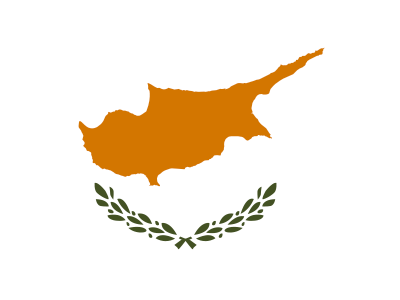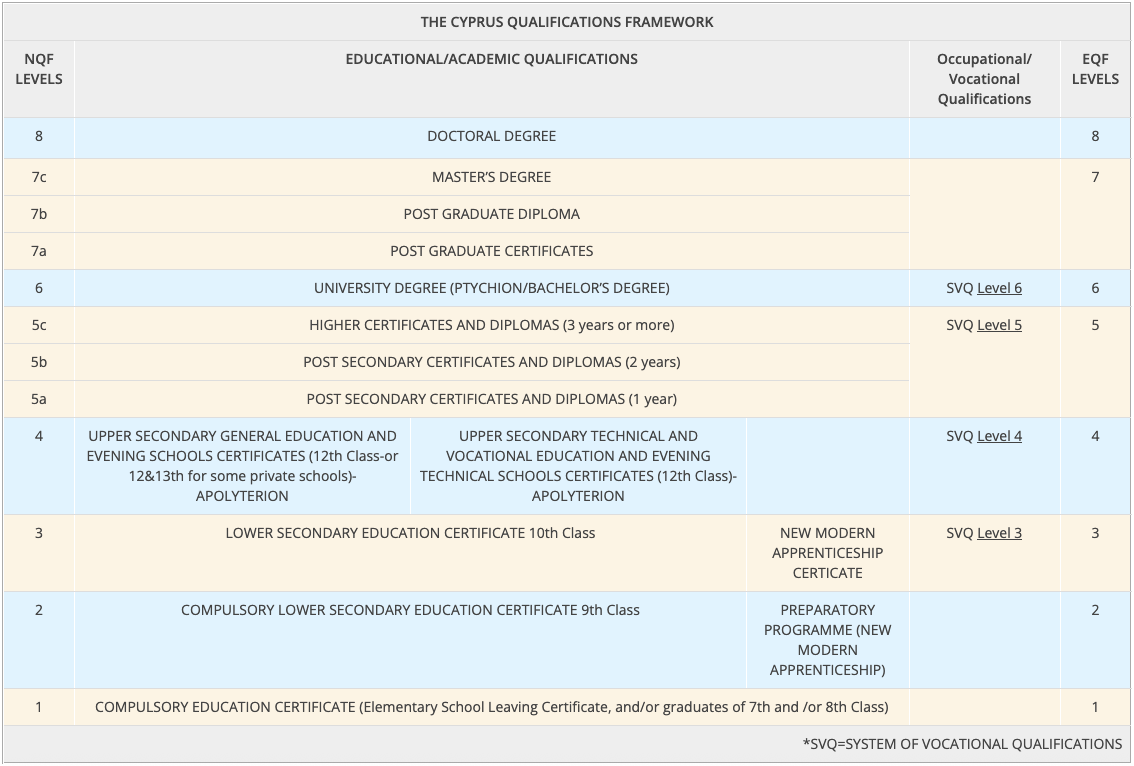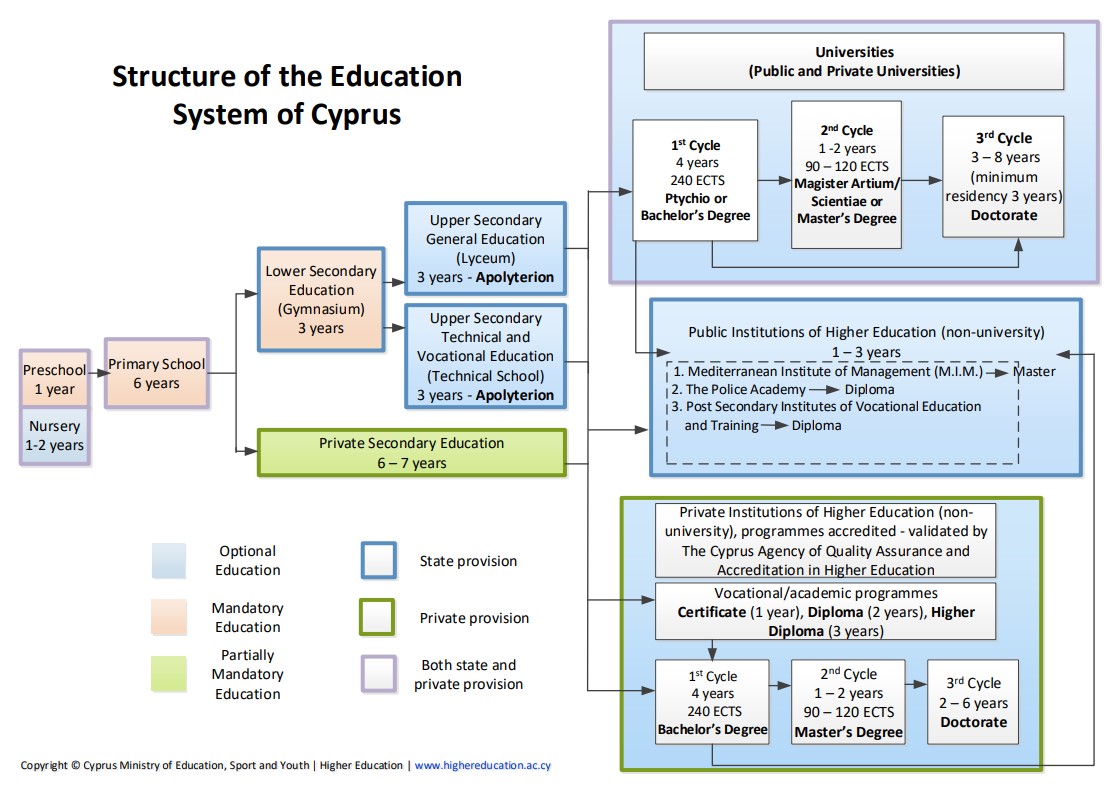
Cyprus
Last updated in July 2025.
1. Higher Education System
1.2. Description of Higher Education System
Cyprus places a great deal of value on Higher Education. The country has one of the highest tertiary educational attainment rate in the EU with 61.6 % of 30-34 year olds having a Higher Education degree in 2023 (EU average: 43.1 %).
Cyprus’ Higher Education sector is still comparatively young (the country’s first University – The University of Cyprus – was founded in 1989 and became operational in 1992), but it has nonetheless expanded substantially over the past three decades. The Higher Education System in Cyprus consists of Universities and Institutions of Higher Education, both Public and Private.
Some of the Institutions of Higher Education offer short term programmes, mostly for specific professions, that provide students with Certificates (1 year), Diplomas (2 years), and Higher Diplomas (3 years). Many courses include periods of placement at the workforce environment. There is also a significant number of Institutions of Higher Education that along with Universities, provide Bachelor’s and Master’s degrees. Two Private Institutions, namely the Cyprus Institute and the Cyprus Institute of Neurology and Genetics, provide PhD Programmes. The Open University of Cyprus is the country’s only Public University devoted entirely to open and distance education and lifelong learning. Distance learning is also provided as an option by the majority of the Institutions of Higher Education, especially after the emergency measures that Cyprus Government implemented towards the interception of the COVID-19 pandemic.
Cyprus Universities, both Public and Private, offer Academic and Professional Bachelor’s degrees of 4-years duration (240 ECTS*). A Bachelor’s degree is a stepping stone for studies at a Master’s level. Master programmes are characterised by the integration of education and research. Students are given the choice to fulfil the programmes requirements either by succeeding in a specific number of modules (total 120 ECTS*) or by combining selected modules along with a Master’s dissertation.
Doctorate degree is the highest level of an academic degree provided by Cyprus’ Universities and Institutions of Higher Education. It is based on an original research project and aims to contribute in an innovate way to the existing international knowledge in any subject area.
*ECTS = European Credit Transfer and Accumulation System
1.3. List of Higher Education Institutions
The List of Higher Education Institutions can be found on the Website of the Ministry of Education, Sport and Youth‘s Department of Higher Education by clicking on “Institutes of HE”.
1.4. Number of Students in Higher Education
Table 1: Population of Students per Type of Higher Education Institution for the Academic Year 2022-2023
| 2022-2023 | ||||
| Type of Higher Educational Institution | Students | |||
| Cyprus | European Union | Rest of the World | Total | |
| Public and Private Universities | 19666 | 23069 | 4883 | 47618 |
| Public and Private Institutions of Higher Education | 5178 | 496 | 3507 | 9181 |
| Total | 24844 | 23565 | 8390 | 56799* |
Table 2: Students enrolment per programme of study for the Academic Year 2022-2023
| 2022-2023 | ||||||
| Enrolments | Outgoing mobility | |||||
| Cypriot students | European Union students | International students | Total | |||
| Public and Private Institutions of Tertiary Education | Programmes of studies (1-3 years) Certificate, Diploma, Higher Diploma | 2124 | 171 | 462 | 2747 | 109 |
| Bachelor’s | 1856 | 243 | 2627 | 4726 | 58 | |
| Master’s | 1133 | 53 | 387 | 1573 | 0 | |
| PhD | 64 | 24 | 31 | 119 | 7 | |
| Total | 5177 | 491 | 3507 | 9175* | 174 | |
| Public and Private Universities | Programmes of studies (1-3 years) Certificate, Diploma, Higher Diploma | 172 | 19 | 4 | 195 | 0 |
| Bachelor’s | 12905 | 5732 | 3571 | 22208 | 333 | |
| Master’s | 5492 | 16415 | 1087 | 22994 | 106 | |
| PhD | 1033 | 411 | 153 | 1597 | 7 | |
| Total | 19602 | 22577 | 4815 | 46994* | 446 | |
| Total Universities and Institutions of Tertiary Education | 24779 | 23068 | 8322 | 56169* | 620* | |
*The source of these results is the report from an administrative survey conducted by the Department of Higher Education. The total student population for the academic year 2022-2023 was 56,912, 47,730 students enrolled in Public and Private Universities and 9,182 in Public and Private Institutions of Tertiary Education. It should be noted that some Higher Education Institutions (HEIs) did not provide data regarding students’ country of origin and/or outgoing mobility.
1.5. Structure of Academic Year
The academic year consists of two semesters as follows:
- Fall Semester: September – January
- Spring Semester: February – June
Each semester ends with an examination period and for the majority of HEIs there is also a second chance examination period in August-September.
1.6. National Qualifications Framework (or Similar)
The Cyprus National Qualifications Framework (CyQF) is aligned with the European Qualifications Framework and is structured as follows:

http://www.cyqf.gov.cy/index.php/en/diagram
1.7. Learning Outcomes in Higher Education
An eight-level reference structure is adopted through the Cyprus National Qualifications Framework, with level descriptors being described in terms of knowledge, skills and competencies. Knowledge is defined by type and complexity of knowledge involved and ability to place one’s knowledge in a context. Skills are expressed by type of skills involved, complexity of problem-solving, and communication skills. Competencies are defined by space of action, cooperation and responsibility, and learning skills. Higher education institutions describe subject-specific learning outcomes for each academic programme. For more information: Cyprus Qualifications Framework (CyQF)
1.8. Admission Requirements to Higher Education
| Type of Educational Institute |
Students Admission Requirements |
|
| Public Universities | Undergraduate Studies | The entrance to undergraduate studies in the two conventional Public Universities of Cyprus is attained upon success at the Pancyprian Exams which are organised centrally by the Ministry of Education, Sports and Youth. Eligible to participate at the Pancyprian Exams are holders of a Cypriot Secondary School Leaving Certificate (Apolyterion) or an equivalent foreign qualification verified by an Accreditation Council/Body of the country of origin. The Open University of Cyprus offers Bachelor’s Degrees only in Greek. |
| Postgraduate Studies | Applicants must have a University degree awarded by an accredited Institution of HE in the country where it operates, or a degree evaluated as equivalent to a University degree by the Cyprus Council for the Recognition of Higher Education Qualifications (KY.S.A.T.S.). In general, academic Bachelor’s degrees give access to Master’s degrees and Master’s degrees give access to PhD programmes. For admission to some postgraduate programmes, candidates are required to have proficiency in English that can be demonstrated through international certificates of English Language Proficiency (e.g. IGCSE, IELTS, TOEFL). For the majority of programmes of study applicants for PhD Degree must be holders of a Master Degree. |
|
| Private Universities | Undergraduate Studies | The general admission requirement for entry to an undergraduate programme of study is a recognised Secondary School Leaving Certificate or equivalent. Some programmes may have additional requirements, in which case, they are specified separately under the relevant programme requirements. English is often the main language of instruction at Private Universities. Students may be required either to take an English test before registering for classes, or to prove that they have passed an internationally recognised English examination which indicates their level of English proficiency. |
| Postgraduate Studies | The minimum requirement for admission into a Postgraduate Study Programme (Master’s degree) is a Bachelor’s Degree from an accredited Institute of HE. In addition to the minimum requirements, special admission requirements may apply for some Departments. For the majority of programmes of study applicants for a PhD Degree must be holders of a Master’s Degree. | |
| Public and Private Institutions of Higher Education | Post-Secondary Certificates and Diplomas (1, 2, 3 years duration) | Admission requirements may vary depending on the Institutions’ requirements. However, the following two are necessary: – Qualified Secondary School Leaving Certificate. – Proof of proficiency in English language. |
| Undergraduate Studies | ||
| Postgraduate Studies (where applicable) | Basic admission requirements: -University degree or equivalent qualification in any subject. -Master degree when applying to PhD programmes. -Proof of proficiency in English language for programmes offered in English. |
|
1.9. Grading System
In general, for Bachelor’s and Master’s degrees the grading system ranges between 0 – 10 with an interval of half points (7.5, 8.5 etc.). Grade 5 is the pass mark in an overall average of assignments, tests and final examinations.
1.10. Tuition Fee System for International Students
| Type of Educational Institute |
Tuition fees |
|
| Public Universities | Undergraduate Studies | EU students €3417,20/yearly (FREE – paid by the Republic of Cyprus) Non EU students €6868,41/yearly |
| Postgraduate Studies | €5124-€15000/in total | |
| Private Universities | Undergraduate and Postgraduate Studies | Tuitions and fees are approved by the Ministry of Education and Culture of Cyprus and are announced at the Institutions’ official websites. Nevertheless, the Universities reserve the right to change the fees and charges where appropriate €9000-€25000* *For the field of Medicine |
| Public and Private Institutions of Higher Education | Post-Secondary Certificates and Diplomas (1, 2, 3 years) | In general tuition fees vary depending on the institutions’ regulations and programmes offered. International students ≈ €3500-€6500/yearly |
| Undergraduate Studies | International students ≈ €4000-€7500/yearly | |
| Postgraduate Studies (where applicable) | International students ≈ €5500-€7500/in total | |
1.11. Graduation Requirements and/or Qualification Awarding Requirements
There are specific graduation requirements, which are clearly outlined in each Institution of Higher Education’s Prospectus.
1.12. Relevant Current/Prospective Reforms in Higher Education
There are no relevant current/prospective reforms in HE at present.
2. Quality Assurance in Higher Education
2.1. Quality Assurance Body in Higher Education
The Cyprus Agency of Quality Assurance and Accreditation in Higher Education (CYQAA), is responsible to ensure the quality of Higher Education in Cyprus and to support, through the procedures provided by the relevant legislation for the continuous improvement and upgrading of Higher Education Institutions (HEI) and their programmes of study.
Additionally, CYQAA has extended competencies as provided by law amongst which are the following:
- Institutional, Departmental and Programmatic Evaluation and Accreditation of Higher Education.
- Quality Assurance in Higher Education on the basis of the European Standards.
- The Evaluation and Accreditation of cross-border forms of education, offered by local Institutions of HE in member states or third countries.
- Assessment of the conditions for the provision of cross-border education from foreign Institutions of HE in Cyprus.
- Assessment of inter-institutional cooperation of HEI.
- The provision of information of Quality Assurance in Higher Education.
With the cooperation of HEIs, CYQAA is a major contributor towards the effort for the establishment of Cyprus as International Educational and Research Center, in accordance to the standards and guidelines provided by the European Network for Quality Assurance (ENQA). CYQAA is a full member of the European Network of Quality Assurance (ENQA) and a full member of the International Network for Quality Assurance and Accreditation Higher Education (INQAAHE). It is also included on the European Network of Quality Assurance Register (EQAR), and is recognised by the World Federation for Medical Education (WFME).
The lists of all recognised Institutions of Higher Education and their accredited programmes of study as well as evaluation for each HEI, are published on the CYQAA’s website: Home (dipae.ac.cy). Moreover, CYQAA’s external quality assurance results can be found at EQAR’s database, DEQAR: Database of External Quality Assurance Results – EQAR.
2.2. Quality Assurance System
| Study programme | Institution | Further explanation | ||
| Voluntary | ||||
| Compulsory | √ | √ | ||
| Regularity (years) | 5 years | 5 years | ||
| External | √ | √ | ||
| Internal | √ | √ | ||
| Further information:
All Higher Education Institutions are obliged by the relevant laws to have an Internal Evaluation Committee which is responsible to conduct a General Evaluation Report for the Institution, every three years. CYQAA has the authority to require such a report on an annual basis. Every 5 years CYQAA goes through an external evaluation process that refers to Institutional, Departmental or Program of Study Evaluation. |
||||
2.3. Programme Authorisation and Quality Assurance
On the basis of the evaluation/accreditation of CYQAA, Higher Education programmes are recognised and students receive a legally recognised degree.
The lists of all recognised Institutions of Higher Education and their accredited programmes of study as well as evaluation results for each HEI, are published on the CYQAA’s website.
3. Credit System in Higher Education
3.1. Description of Credit System
3.2. Credit Transfer System(s)
ECTS – European Credit Transfer and Accumulation System.
3.3. Additional Information
3.4. Is Application of Credit System in Higher Education Institutions Mandatory?
Yes.
3.4. Number of Credits per Academic Year/Semester
The number of credits per standard academic year is 60 ECTS (30 ECTS/semester).
3.6. Number of Credits per Higher Education Cycle
Post-Secondary Certificates and Diplomas (level 5) are 60-180 ECTS. Most Bachelor programmes (level 6) are 240 ECTS. The number of ECTS for a Master programme (level 7) is minimum 90 ECTS and ranges between 90 and 180 ECTS. ECTS for a PhD (level 8) range from 180 to 300 ECTS.
3.7. Description of Credit Unit
1 ECTS-credit equals 25-30 hours (of 60 minutes) of a student’s workload. Workload (ECTS-definition) is an estimation of the time the individual typically needs to complete all learning activities such as lectures, seminars, projects, practical work, work placements and individual study required to achieve the defined learning outcomes in formal learning environments.
3.8. Link between Learning Outcomes and Credits
A student is awarded credits upon achievement of the defined learning outcomes related to the educational unit/course. Learning outcomes (ECTS-definition) are statements of what the individual knows, understands and is able to do on completion of the learning process. The achievement of learning outcomes has to be assessed through procedures based on clear and transparent criteria.
Learning outcomes are attributed to individual educational components and to programmes as a whole. They are also used in European and National Qualifications Frameworks to describe the level of the individual qualification.
